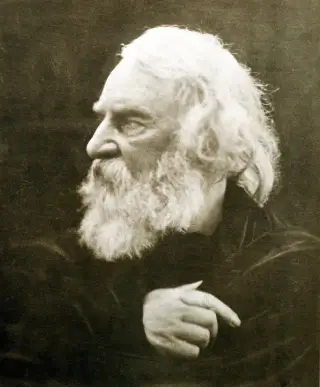Biography of Henry Wadsworth Longfellow

| date | place | |
|---|---|---|
| born | February 27, 1807 | Portland, Massachusetts |
| died | March 24, 1882 | Cambridge, Massachusetts |
Henry Wadsworth Longfellow was born on February 27, 1807, in Portland, Maine, into a prominent family. His father, Stephen Longfellow, was a lawyer and a member of the Maine legislature, while his mother, Zilpah Wadsworth Longfellow, hailed from a well-respected family with deep roots in New England. The Longfellow family was known for its intellectual pursuits, and Henry was encouraged to read and explore literature from a young age. Longfellow attended Portland's public schools before enrolling at Bowdoin College in Brunswick, Maine, at the age of 14. He graduated in 1825 with a Bachelor of Arts degree. During his time at Bowdoin, he developed friendships with several future literary figures, including Nathaniel Hawthorne and Franklin Pierce, who would later become the 14th President of the United States. His college experience ignited his passion for literature and languages, which would shape his future career. After graduating from Bowdoin College, Longfellow began his career as a professor of modern languages at his alma mater. In 1826, he traveled to Europe to study various languages and cultures. He spent several years in countries such as France, Spain, Italy, and Germany, immersing himself in their rich literary traditions. This European experience greatly influenced his writing style and broadened his worldview. Upon returning to the United States in 1829, Longfellow published his first book of poetry, "Voices of the Night," which garnered positive reviews and established him as a promising poet. He continued to teach at Bowdoin College until 1835 when he accepted a position as a professor of modern languages at Harvard University. This move marked a significant turning point in his career as it allowed him to reach a wider audience and engage more deeply with the literary community. Longfellow's personal life was marked by both joy and tragedy. In 1831, he married Mary Storer Potter, but their marriage was short-lived; Mary died just three years later due to complications from childbirth. This loss deeply affected Longfellow and left him heartbroken. In 1843, Longfellow married Frances "Fanny" Appleton, the daughter of a wealthy Bostonian. Their courtship was characterized by letters exchanged between them while Fanny was in Europe. They had six children together: Charles Appleton (1844–1893), Ernest Wadsworth (1845–1850), Fanny (1847–1861), Alice Mary (1850–1928), Edith (1853–1915), and Julian (1858–1934). The family lived in a charming home in Cambridge, Massachusetts, which became a hub for literary gatherings. Tragedy struck again in 1861 when Frances died in a fire caused by an accidental ignition of her dress while she was working on a project with hot wax. Longfellow attempted to save her but suffered severe burns on his face and hands during the rescue attempt. This traumatic event profoundly impacted him; he entered a period of deep mourning that influenced his writing during the following years. Despite the personal tragedies he faced, Longfellow continued to write prolifically throughout his life. He became one of the most beloved poets in America during the 19th century and was known for his accessible style that resonated with readers from all walks of life. His works often reflected themes of love, nature, history, and human experience. In addition to being an accomplished poet, Longfellow was also an educator who made significant contributions to Harvard University. He became the first American to translate Dante Alighieri's "Divine Comedy," which helped introduce Italian literature to American audiences. His translation remains one of the most respected English versions. Longfellow’s influence extended beyond literature; he was also an advocate for social causes such as abolitionism and women's rights. He used his platform to speak out against slavery and supported various reform movements throughout his life. Longfellow passed away on March 24, 1882, at the age of 75. His funeral service was attended by many prominent figures of the time, reflecting his status as one of America’s most cherished poets. He is buried in Mount Auburn Cemetery in Cambridge. Henry Wadsworth Longfellow's life was characterized by both profound personal struggles and remarkable literary achievements. His ability to weave narrative depth into lyrical poetry has left an indelible mark on American literature. Today, he is remembered not only for his poetic contributions but also for his role as an educator and advocate for social change. His legacy continues to inspire readers and writers alike across generations, making him a quintessential figure in American cultural history. Henry Wadsworth Longfellow's poetry remains a cornerstone of American literature, celebrated for its emotional depth and lyrical beauty. As one of the most beloved poets of the 19th century, Longfellow's poems often explore themes of love, nature, and the human experience, resonating with readers from various backgrounds. His most famous works, such as "Paul Revere's Ride," "The Song of Hiawatha," and "Evangeline," showcase his ability to blend storytelling with rich imagery. Longfellow's accessible style made his poetry popular among both literary critics and the general public, ensuring his place in the pantheon of great American poets. Longfellow's poems are not only significant for their content but also for their cultural impact. They reflect the spirit of a nation grappling with its identity during a time of change and turmoil. Through his evocative verses, Longfellow captured the essence of American life, making his work timeless and relevant even today. Readers seeking to explore Henry Wadsworth Longfellow's poems will find a treasure trove of inspiration and insight that continues to influence poets and writers around the world. His legacy endures as a testament to the power of poetry to connect people across generations.
Feel free to be first to leave comment.